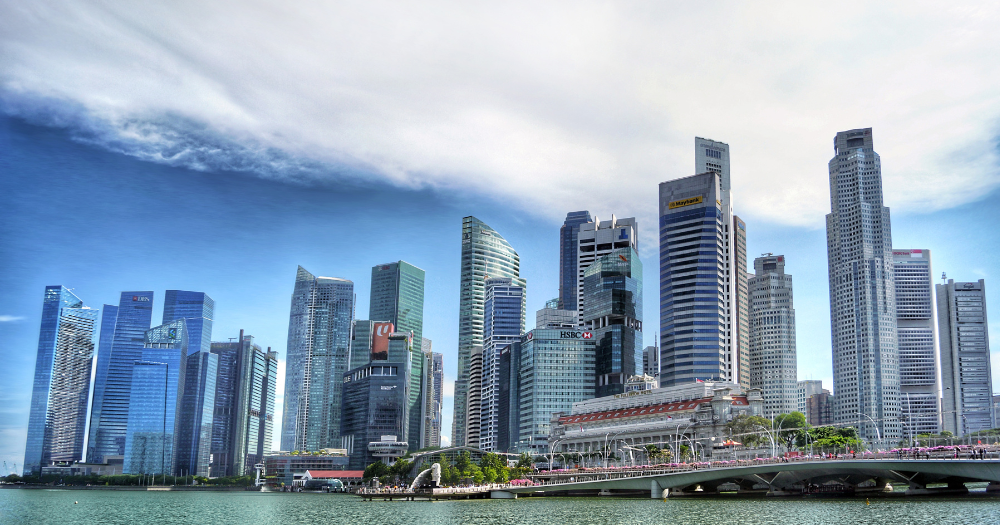MTI raises growth forecast for 2024 to 3.5%, cites better-than-expected economic performance
GDP growth in the third quarter of 2024 was primarily driven by manufacturing, wholesale trade and finance and insurance sectors.

The Ministry of Trade and Industry (MTI) has raised the economic growth forecast for Singapore in 2024 from 2 to 3 per cent to around 3.5 per cent.
According to a press release by MTI, this follows the ministry accounting for the better-than-expected performance of the Singapore economy in the first three quarters of 2024, which grew at 3.8 per cent on a year-on-year basis, as well as the latest global and domestic situations.
In addition, the third quarter of 2024 saw Singapore's economy expand by 5.4 per cent on a year-on-year basis, faster than the 3.0 per cent growth in the second quarter.
On a quarter-on-quarter seasonally-adjusted basis, the economy grew by 3.2 per cent, accelerating from the 0.5 per cent expansion in the previous quarter.
GDP growth in third quarter primarily driven by manufacturing, wholesale trade and finance and insurance sectors
MTI added that GDP growth in the third quarter of 2024 was primarily driven by the manufacturing, wholesale trade and finance and insurance sectors, which were bolstered in part by the upturn in the global electronics cycle.
On the other hand, consumer-facing sectors such as the retail trade and food & beverage services sectors continued to contract due to the sustained strength in outbound travel by locals, as well as a slower-than-anticipated recovery in the arrival of international visitors and weak tourist spending.
Manufacturing sector
MTI noted that the manufacturing sector expanded by 11 per cent year-on-year in the third quarter of 2024, reversing the 1.1 per cent contraction in the previous quarter.
The strong performance of this sector was driven by an expansion in output across all clusters.
In particular, the electronics cluster grew robustly, supported by strong demand for smartphone and PC semiconductor chips, even though demand for automotive and industrial semiconductor chips remained weak.
On a quarter-on-quarter seasonally-adjusted basis, the sector expanded by 13.5 per cent, a reversal from the 1.1 per cent contraction in the preceding quarter.
Wholesale trade
The wholesale trade sector expanded by 4.9 per cent year-on-year, similar to the 4.8 per cent growth in the second quarter of 2024.
Growth during the third quarter was largely supported by an expansion in the machinery, equipment and supplies segment, which was in turn boosted by the sales of electronic components, telecommunications and computers.
Meanwhile, the fuels and chemicals and "others" segments similarly expanded during the third quarter.
The "others" segment refers to a range of products including metals, timber & construction materials, household equipment and furniture as well as food, beverages and tobacco, among others.
On a quarter-on-quarter seasonally-adjusted basis, the sector grew by 0.6 per cent, a decrease from the 2.6 per cent growth in the previous quarter.
Finance and insurance
As for the finance and insurance sector, it grew by 5.4 per cent year-on-year in the third quarter, extending the 6.4 per cent expansion in the previous quarter.
Growth of the sector was mainly supported by an increase in net fee and commission incomes in the banks, fund management, forex and security dealing activities segments.
This was in turn driven by stronger trading activity amidst heightened financial market volatility.
At the same time, the insurance and other auxiliary activities segments — comprising mainly payments firms — continued to record "firm" growth, MTI added.
On a quarter-on-quarter seasonally-adjusted basis, the sector expanded by 0.3 per cent, the same pace of growth as that recorded in the second quarter.
Global economic situation for 2024
As for the global economic situation, MTI reported that major economies such as the U.S. and Eurozone, as well as some regional economies such as Malaysia, performed better than projected in the third quarter of 2024, mainly due to stronger-than expected consumption growth in the respective economies.
Meanwhile, China’s GDP growth continued to slow in line with expectations over the same period.
For the rest of the year, the U.S.’ GDP growth is expected to moderate as consumption growth weakens in tandem with gradually easing labour market conditions.
GDP growth in the Eurozone is also projected to be modest, weighed down by subdued industrial activity and investments.
By contrast, China’s economy is projected to pick up slightly on the back of government support measures that were recently announced.
MTI added that on balance, Singapore’s overall external demand outlook is expected to remain resilient for the rest of 2024.
Economic growth for 2025 posited at one to three per cent
With regard to 2025, MTI said the Singapore economy is expected to grow by one to three per cent.
MTI cited an increase in global economic uncertainties, including uncertainty over the policies of the incoming U.S. administration, with the risks tilted to the downside.
There is also a risk of further escalation of geopolitical conflicts, including in the Middle East, and trade tensions among major economies which could lead to higher oil prices and production costs, as well as greater policy uncertainty.
In turn, this could lead to a decline in global investment and trade, and weigh on global growth.
In addition disruptions to the global disinflation process could lead to tighter financial conditions for longer and the de-synchronisation of monetary policies across economies, potentially triggering latent vulnerabilities in financial systems.
Growth outlook for Singapore in some sectors remains strong despite global uncertainties for 2025
However, against this backdrop, the growth outlook of the manufacturing and trade-related services sectors in Singapore remains positive, MTI said.
In particular, the electronics cluster is projected to continue its expansion, supported by strong demand for semiconductor chips in end-markets such as PCs and smartphones amidst the PC refresh cycle and rollout of Artificial Intelligence (AI)-capable devices.
This will have positive spillover effects on the precision engineering cluster and the machinery, equipment and supplies segment of the wholesale trade sector.
At the same time, demand in the aerospace and marine and offshore engineering segments should drive growth in the transport engineering cluster.
Similarly, outward-oriented services sectors such as the information and communications along with the finance and insurance sectors are projected to register healthy growth on account of sustained enterprise demand for digital solutions and services and favourable financial conditions amidst global policy rate cuts, respectively.
Meanwhile, tourism-related sectors like the accommodation sector will benefit from the continued recovery in international visitors.
Top image via Canva
MORE STORIES




















